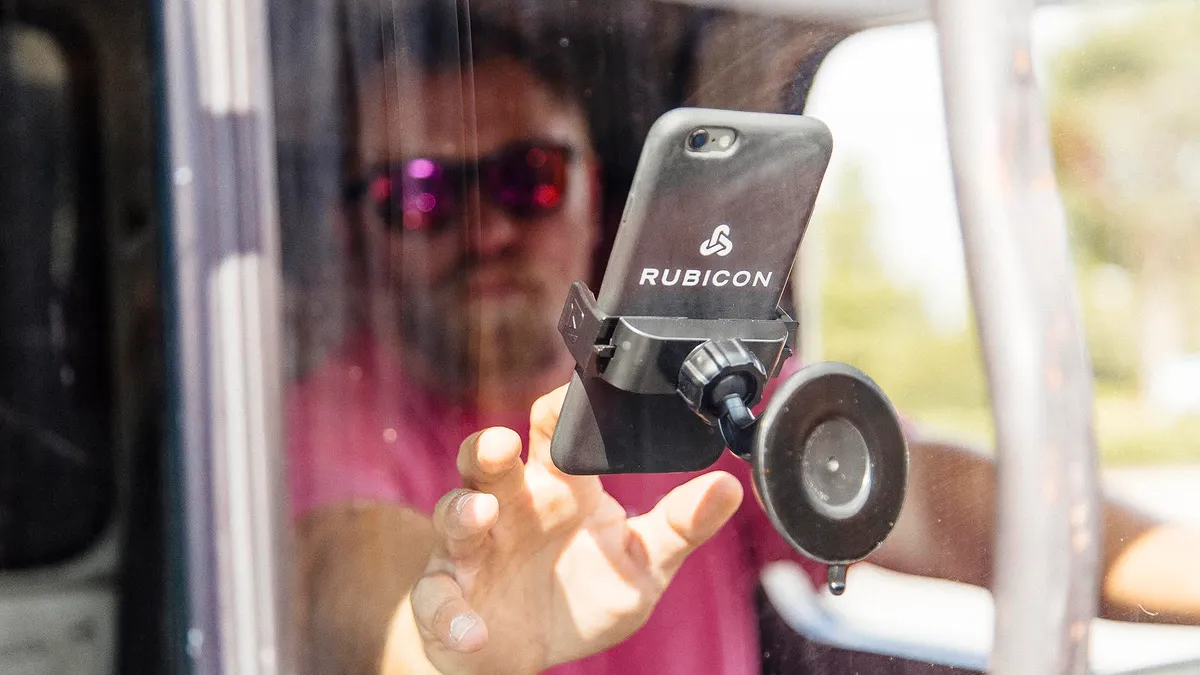Dive Brief:
- Rubicon Global's smart cities data program is now running in more than 20 municipalities, as first announced at a WasteExpo panel. New additions include Woodway and Tyler, TX, and multiple Atlanta suburbs. A larger "top 10" city is said to be joining that list within the month.
- While the initial three "RUBICONSmartCity" pilots were with municipal fleets, the company is now working with private haulers that have existing residential collection contracts. Examples include Frontier Waste Solutions in Texas and Latham Home Sanitation in Georgia. The next step is to make this an additional service companies can offer in the RFP process.
- "I want our independent haulers to be able to compete against the biggest players in the industry for residential franchise agreements," Michael Allegretti, senior vice president of policy and strategic initiatives, told Waste Dive. "They're able to now say to that prospective city purchaser, 'Not only will I have a good price and good service, but I'm going to collect data for you — data you might not even be asking for — and proactively share it with you to prove that I'm doing what I say I'm doing in terms of service quality. To give you insight into the waste stream of your city.'"
Dive Insight:
Rubicon is by now well-known for the services it offers to businesses, with all of the promises around sustainability, data collection and routing efficiency that entails. The company touts an estimated 750,000 "user locations" serviced by more than 5,000 hauling partners.
The same app concept hauling partners use for commercial service is what is now being tailored for the needs of individual cities with biweekly updates. At last year's WasteExpo, Allegretti presented about how collection vehicles could be "roving data centers" capturing information on street conditions, traffic patterns, property vacancies and much more.
That list of information streams also includes automated service confirmations and other useful operating information through Rubicon's app. Atlanta wanted a baseline for sustainability policy, which later led to work on contamination with The Recycling Partnership. Santa Fe wanted to normalize shift lengths by improving route efficiency. Columbus, GA wanted to improve service rates.
Based on these initial partnerships, Allegretti said Rubicon has begun to see that many local governments either don't have the ability to capture useful data, or have more data than they know how to analyze. "We're diagnosing patients that don't know they have the disease. The disease is a lack of usable data to drive changed behavior," said Allegretti.
While the service is currently described as a bonus hauling partners can offer for existing or future residential contracts, it's still unknown how the financials work out on Rubicon's end. Allegretti declined to go into detail, but described RUBICONSmartCity as "one of the fastest growing" of "three pillars" at the company.
During the panel, Allegretti also hinted at the growing potential of autonomous technology, saying “I think it is logical that our industry will be the first for autonomous trucks." He later clarified the company views this as still involving humans in some form and the next steps in this area will be to automate more features within the app.
This autonomous work has been the subject of multiple patents that do include collection in residential settings. Rubicon remains quiet on this front, and Allegretti declined to say whether the company could ever end up owning equipment, but he said the goal is to keep any of this from being too expensive for governments.
"We don't want to reinvent the wheel," he said. "We want it to be very modular, very plug-and-play. We want to offer governments or private haulers serving residential franchises the opportunity to essentially custom build the number of features, the types of features that they want. So I think part of that means having an ecosystem of partners around us, versus devoting large sums of money to product development that's outside of the core."
More of this is expected to come into focus during the year, but if nothing else, it's already clear that Rubicon's residental play is looking increasingly serious.












